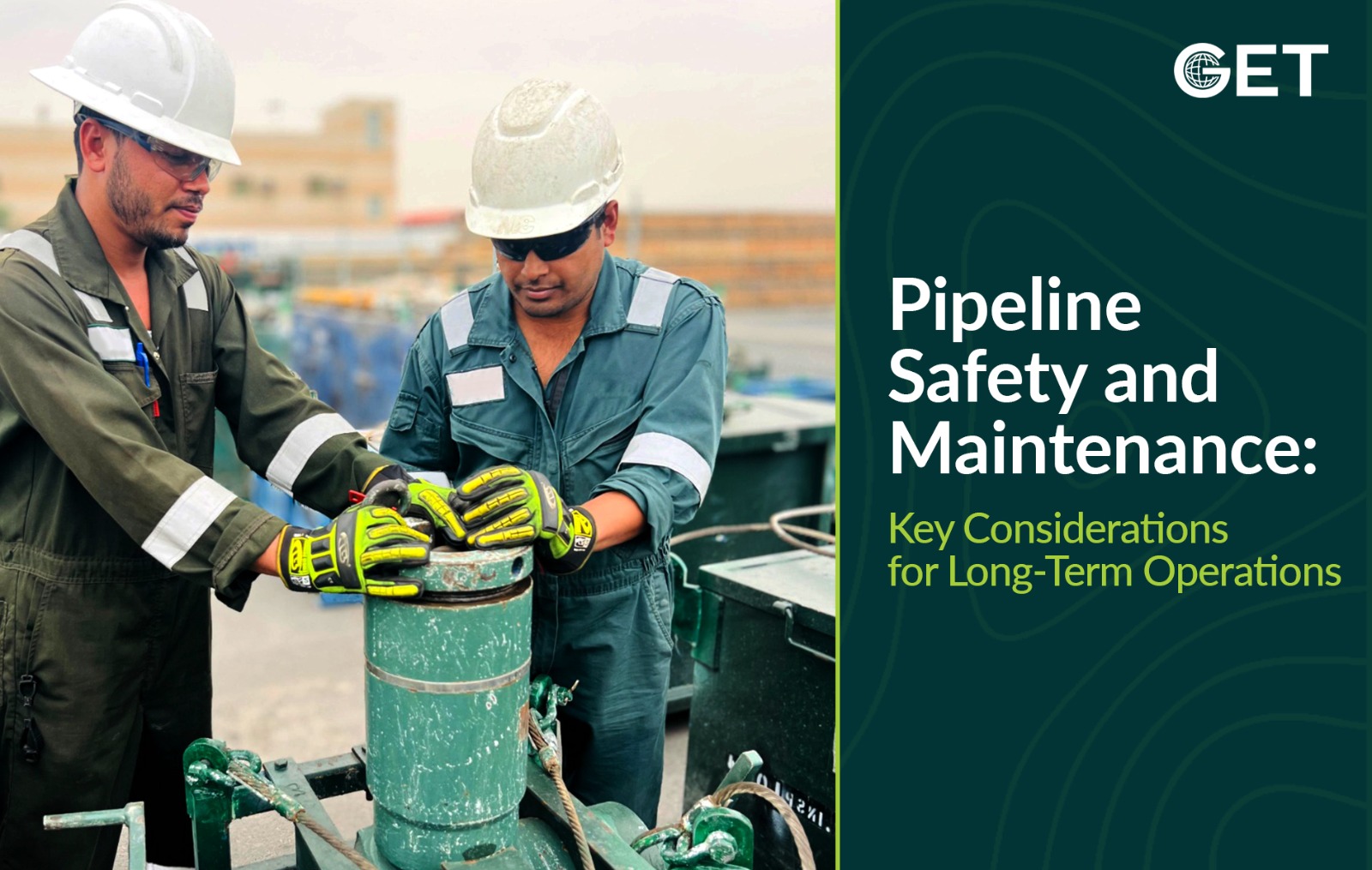
Pipelines are critical and cost-effective assets in the oil and gas industry, transporting gas and oil from remote to populated regions. They provide an uninterrupted supply of energy resources and raw materials to industries and distribution networks, significantly contributing to the economy.
As the industry’s arteries, pipelines face risks, logistical challenges, and significant expenses. They require meticulous maintenance and strong safety protocols for long-term operational integrity.
Supported by a global network of experienced staff and qualified vendors, we offer inspection, maintenance, and repair services. Our customized service contracts range from basic support to advanced expertise, leveraging cutting-edge technology and market knowledge to meet clients’ maintenance needs.
INTEGRATED MAINTENANCE SERVICES
Integrated maintenance solutions optimize production without compromising safety. In the upstream oil and gas industry, complex machinery operates under extreme conditions, making maintenance crucial for equipment longevity, performance, safety, environmental compliance, and cost efficiency. Equipment wear and tear and unexpected downtimes impact production and profitability. GET addresses these issues with comprehensive integrated maintenance services.
Regular assessments and inspections prevent equipment failures, minimize downtime, and extend asset lifespan. Pipeline operators must implement periodic checks and programs to ensure maintenance and prevent mishaps.
With strategic global partnerships, GET’s technicians offer maintenance services worldwide.
GET Global Group’s maintenance services-
- Visual Inspection: Identify surface defects in metal parts, such as mechanical damage, cracks, and loose threads, during equipment assembly and operation.
- Instrumental Inspection: Ensure components and assemblies comply with regulations and specifications, and evaluate the damage tolerance of defects found during visual inspections through methods like Spark and Hydro Tests.
- Maintenance and Replacement: Perform maintenance and replacement of downhole motors according to specific service manuals, including cleaning, calibration, relining, and repairs.
Key factors for long term operations
The pipeline industry faces challenges like infrastructure shortcomings, corrosion, external interference, and other operational issues.
- Approvals: Securing approvals from government bodies and local communities can be delayed due to outdated records, illegal land occupation, and political interference.
- Length: Maintaining pipelines stretching across thousands of kilometers is challenging.
- Emergency Response: Unplanned downtime and safety hazards from pipeline leaks or bursts can be mitigated through proactive maintenance. Planned schedules prevent accidents, keeping assets in optimal condition and enhancing safety.
- Technical Advancement: Remote monitoring, automated control systems, and predictive analytics reduce the need for physical interventions and minimize risks. These technologies detect and address potential issues early, ensuring safe pipeline operation.
- Environmental Impact: Pipeline spills and explosions pose environmental hazards. GET prevents such incidents with stringent maintenance protocols and advanced technologies, minimizing environmental impact and promoting sustainability.
- Infrastructure Shortfalls:Inadequate capacity, aging assets, and difficult terrains require strategic planning, investment, and adherence to safety standards.
- Route Selection: GET uses planning tools and risk assessment methodologies to identify the best routes, considering geographical hazards, minimizing environmental impact, addressing community concerns, and ensuring safety.
- Corrosion: A leading cause of pipeline failure, corrosion results in leaks and contamination. GET uses advanced coatings, cathodic protection systems, and regular inspections to prevent corrosion.
- Pipeline Transportation: This involves design, engineering, and operations, emphasizing safety, asset integrity, compliance, and risk management, and must be handled with utmost care.
- Operational Aspects: Safe, reliable operations depend on asset integrity, compliance, and effective risk management. GET’s approach includes modern technologies, rigorous training, and comprehensive compliance checks. Advanced monitoring and predictive analytics enable early issue detection, maintaining operational excellence.
- Business Perspectives: Prioritizing public, employee, and environmental safety enhances reliability and reputation. Compliance ensures legal and operational integrity, balancing safety, environmental conservation, efficiency, and financial performance for sustainability.
Effective pipeline maintenance and safety rely on several tried-and-tested practices:
- Risk Management: Measure and monitor risks continuously, updating assets and technology to prevent accidents and protect public safety and environmental integrity. Prevent corrosion by using ideal pipeline materials and protective agents.
- Pipeline Integrity Index: Assess the condition of pipeline assets, including structural integrity, corrosion resistance, and operational reliability. Regular evaluations identify vulnerabilities for timely maintenance and repairs.
- Risk Assessment: Analyze factors like pipeline age, material composition, operating conditions, environmental factors, and regulatory requirements to identify and evaluate potential hazards. Implement measures such as inspections, infrastructure upgrades, protective coatings, and emergency response plans.
- No-Code App: Use a no-code platform to track maintenance, manage inventory, and record safety inspections. Monitor parts and supplies to ensure availability without overstocking and keep all stakeholders updated.
- Pigging: Insert Smart Pigs into pipelines to clean and assess their condition. Regular pigging helps remove buildup, assess internal conditions, and identify defects for preventive maintenance. practices and methods have been tried and tested over the years to improve pipeline operations.
Oil and Gas Pipeline maintenance is an ongoing and multifaceted process. By addressing these challenges, businesses can ensure safe, reliable, and sustainable pipeline operations, significantly contributing to economic prosperity.
